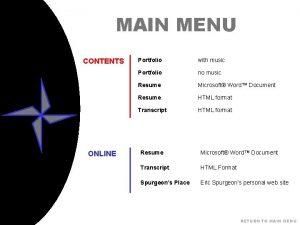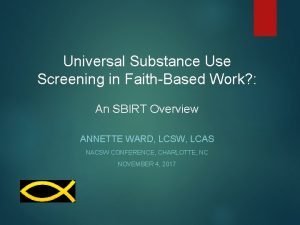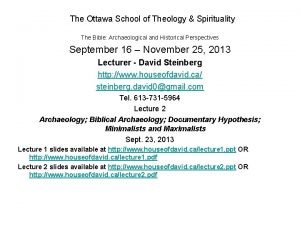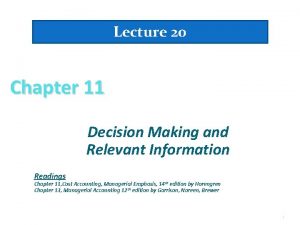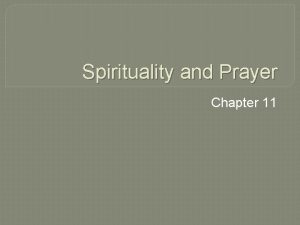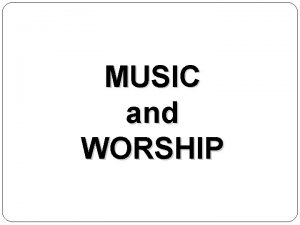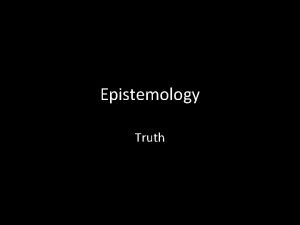MUSIC and WORSHIP Relevant TruthsDoctrines Worship Spirituality Truth











- Slides: 11

MUSIC and WORSHIP

Relevant Truths/Doctrines Worship Spirituality Truth Spiritual Battle Unity Spiritual Maturity Submission Emotion

Music I. References II. Technical Development A. Musicology B. Beauty C. Physiology of Music III. Biblical Development Directive/Descriptive/Principle B. Textual Exposition A. IV. Sacred Music—Hymnology Standards B. History A. V. FAQs VI. Summary/Conclusion

Music I. References II. Technical Development A. Musicology B. Beauty C. Physiology of Music III. Biblical Development Directive/Descriptive/Principle B. Textual Exposition A. IV. Sacred Music—Hymnology Standards B. History A. V. FAQs VI. Summary/Conclusion

Worship in Song Scott Aniol “Since the Bible is sufficient as an authority for all of life, the believer must strive to apply its principles even to situations not directly addressed within the pages of Scripture. When studying any passage of Scripture, the believer must ask, 'What would the original author say to contemporary situations? ' He must correlate extrabiblical information about the contemporary issue and let the Bible's universal moral principles determine his stance toward that issue. . . “Indeed, anyone who claims to hold to the sufficiency of Scripture for faith and practice must be willing to apply the Bible's principles to every situation whether or not that situation is explicitly addressed in the pages of the Bible. To fail to do so is to deny the profitability of the Word of God. . . “I desire to gather pertinent information about music by which it can be judged worthy of such biblical principles and strive to come to God-pleasing conclusions. The Bible does not explicitly lay out instructions for Christians regarding their music. But since Scripture is indeed sufficient for all faith and practice, so it is sufficient to help Christians determine how they should view music in their lives. ” pp. 17, 21 -22

Music I. References II. Technical Development A. Musicology B. Beauty C. Physiology of Music III. Biblical Development Directive/Descriptive/Principle B. Textual Exposition A. IV. Sacred Music—Hymnology Standards B. History A. V. FAQs VI. Summary/Conclusion

Biblical Examination of Music I. Those Who Sing II. Foundational Text A. Qualifications of Those Who Sing B. Purposes of Music C. Variety in Music III. Sing a “New” Song VI. Summary/Conclusion

Those Who Sing Saints on Earth 16: 25 Lord Jesus Christ Angels on Earth Creation Saints in Heaven Angels in Heaven Mixed Choir in Heaven God Himself 2 Chr 5: 11 -13, Psa 66: 1 -4, Acts Matt 26: 30, Heb 2: 10 -13 Job 38: 6 -7, Luke 2: 12 -14 Isa 44: 23, 49: 13 Rev 4: 9 -11 Rev 4: 6 -8 Rev 5: 8 -14 Zeph 3: 17

Biblical Examination of Music I. Those Who Sing II. Foundational Text A. Qualifications of Those Who Sing B. Purposes of Music C. Variety in Music III. Sing a “New” Song VI. Summary/Conclusion

Biblical Examination of Music I. Those Who Sing II. Foundational Text A. Qualifications of Those Who Sing B. Purposes of Music C. Variety in Music III. Sing a “New” Song VI. Summary/Conclusion

Biblical Examination of Music I. Those Who Sing II. Foundational Text A. Qualifications of Those Who Sing B. Purposes of Music C. Variety in Music III. Sing a “New” Song VI. Summary/Conclusion
 Online music portfolio
Online music portfolio Music in the new testament
Music in the new testament Sbirt faith and spirituality
Sbirt faith and spirituality Ways to improve spiritual wellness
Ways to improve spiritual wellness Ottawa school of theology and spirituality
Ottawa school of theology and spirituality Spirituality and addiction
Spirituality and addiction What is an irrelevant sentence
What is an irrelevant sentence Decision making and relevant information
Decision making and relevant information Five step decision making process
Five step decision making process Select significant and relevant information
Select significant and relevant information Chapter 11 decision making and relevant information
Chapter 11 decision making and relevant information Chapter 11 decision making and relevant information
Chapter 11 decision making and relevant information
